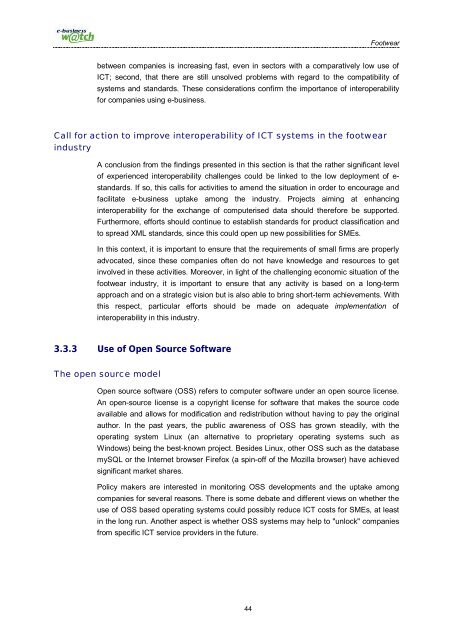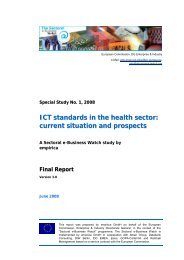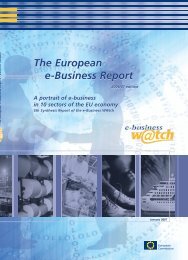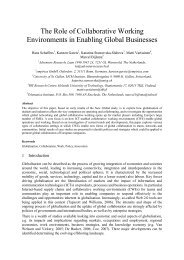Footwear Industry Footwear Industry - empirica
Footwear Industry Footwear Industry - empirica
Footwear Industry Footwear Industry - empirica
Create successful ePaper yourself
Turn your PDF publications into a flip-book with our unique Google optimized e-Paper software.
<strong>Footwear</strong><br />
between companies is increasing fast, even in sectors with a comparatively low use of<br />
ICT; second, that there are still unsolved problems with regard to the compatibility of<br />
systems and standards. These considerations confirm the importance of interoperability<br />
for companies using e-business.<br />
Call for action to improve interoperability of ICT systems in the footwear<br />
industry<br />
A conclusion from the findings presented in this section is that the rather significant level<br />
of experienced interoperability challenges could be linked to the low deployment of e-<br />
standards. If so, this calls for activities to amend the situation in order to encourage and<br />
facilitate e-business uptake among the industry. Projects aiming at enhancing<br />
interoperability for the exchange of computerised data should therefore be supported.<br />
Furthermore, efforts should continue to establish standards for product classification and<br />
to spread XML standards, since this could open up new possibilities for SMEs.<br />
In this context, it is important to ensure that the requirements of small firms are properly<br />
advocated, since these companies often do not have knowledge and resources to get<br />
involved in these activities. Moreover, in light of the challenging economic situation of the<br />
footwear industry, it is important to ensure that any activity is based on a long-term<br />
approach and on a strategic vision but is also able to bring short-term achievements. With<br />
this respect, particular efforts should be made on adequate implementation of<br />
interoperability in this industry.<br />
3.3.3 Use of Open Source Software<br />
The open source model<br />
Open source software (OSS) refers to computer software under an open source license.<br />
An open-source license is a copyright license for software that makes the source code<br />
available and allows for modification and redistribution without having to pay the original<br />
author. In the past years, the public awareness of OSS has grown steadily, with the<br />
operating system Linux (an alternative to proprietary operating systems such as<br />
Windows) being the best-known project. Besides Linux, other OSS such as the database<br />
mySQL or the Internet browser Firefox (a spin-off of the Mozilla browser) have achieved<br />
significant market shares.<br />
Policy makers are interested in monitoring OSS developments and the uptake among<br />
companies for several reasons. There is some debate and different views on whether the<br />
use of OSS based operating systems could possibly reduce ICT costs for SMEs, at least<br />
in the long run. Another aspect is whether OSS systems may help to "unlock" companies<br />
from specific ICT service providers in the future.<br />
44

















